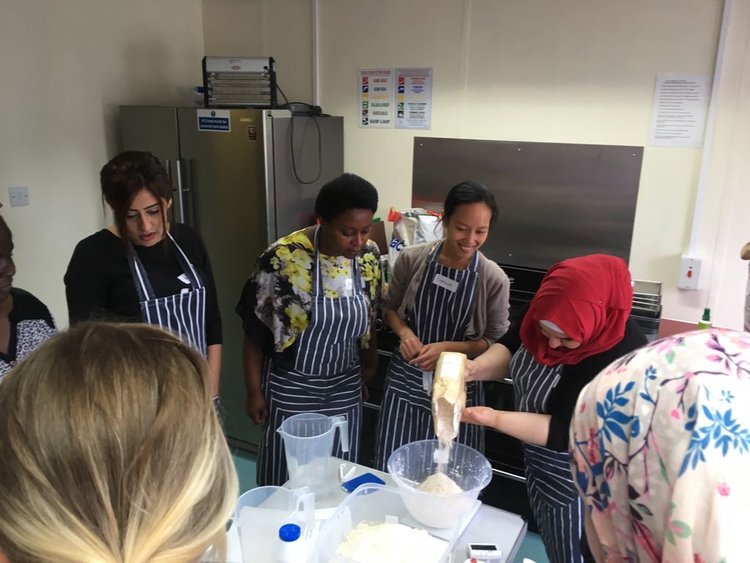Championing inclusion in England’s community business sector
25 May 2021

Community businesses strengthen local economies and enrich the fabric of society. They bring people together to improve their local areas, often operating in low-income areas while supporting our most vulnerable groups.
But running a community business can be challenging, especially during a pandemic. For many, the future is still uncertain.
That’s where we come in. Throughout April, we welcomed 54 community business champions across England onto our Community Business Trade Up Programme, run in partnership with Power to Change.
In its fifth and final year, Community Business Trade Up has been transformative for nearly 300 community businesses. The programme supports community-focused organisations in their early stages to grow their impact and resilience. It aims to help them diversify and increase income from trading, be less grant dependent and become sustainable. We do this through a learning programme and Trade Back grant of up to £10,000.
Reaching the communities hardest hit by Covid-19
We have been committed to our support reaching the people and places hardest hit by the pandemic. Covid-19 has disproportionately affected racialised and minoritised communities, as well as people living in poverty. So, we prioritised places on our programme for these groups.
We’re proud that:
- Around half of the community businesses we’re supporting (52%) are led by or support people from racialised and minoritised communities.
- More than three-quarters (78%) are located in or giving support to very low-income communities (Indices of Multiple Deprivation scores 1-3).
How we did it
We knew we needed to reach beyond our own “echo chamber”. We’re grateful to the support of the Ubele Initiative. They worked with us to make sure the recruitment campaign was relevant and inclusive to racialised and minoritised communities – for example, by looking at language and imagery.
As well as the campaign content, Ubele, Power to Change and SSE used local and regional networks to spread the word to these specific communities.
We were also purposeful in our language. We were explicit that priority places were available for those led by and/or supporting people from racialised and minoritised communities and organisations in low-income areas.
Meet the community businesses!
Here’s a snapshot of some of the amazing community businesses our regional teams are excited to be supporting this year:
Yorkshire and North East
|
North West
Boxing and Personal Development Centre, Oldham
A club that uses sport and lifestyle skills to work with young people facing social and educational barriers. This is alongside the work with the wider community, either at their central location or on an outreach basis.
St Ignatius Centre, Salford
They aim to create local economic opportunities by transforming the disused former St Ignatius Rectory and St Ignatius former church into a sustainable and environmentally efficient community enterprise centre. They promote social inclusion and use heritage, art and culture to improve social mobility and life chances.
Odd Arts, Manchester
Odd Arts aims to address the injustice, inequalities and barriers faced by people in prison and others experiencing disadvantage, discrimination, and vulnerability.
They support over 25,000 people each year and deliver theatre based social-action projects and prevention programmes (radicalisation, exploitation, violence, mental ill health) in education, criminal justice, and community settings.
MidlandsCReheart, DudleyA community centre offering free dance, activities, exercise classes, crafts, socialising opportunities & creativity for young people, who are at risk of gang activity. Proof Community Projects, Coventry (pictured above)
|
London
Refugee Café, Lewisham
Run by refugees, they support integration and aim to challenge the narrative around refugees. They sell food products at farmers markets and online, run events and workshops focused on wellbeing and employment.
Friends of Windmill Gardens, Brixton
A residents’ group that campaigns to restore, preserve and enhance Brixton Windmill and Gardens. During Covid, they have been sending out flour and activity packs for children via food banks. They run all sorts of activities for the community, including bat walks!
Edible London CIC, Haringey
A food and growing project that aims to reduce food inequality, help people eat more nutritious food and be healthier. Their food distribution during Covid, funded by Haringey Council, delivered equivalent of 180,000 meals in fresh produce; 80,000 prepared meals; 600 meals a week at a homeless shelter; and baby food and supplies to whoever needs them.
ClearCommunityWeb, Crystal Palace
They develop digital skills in older people, vulnerable adults, carers and the community groups that serve them. They also train volunteers for other support organisations, including housing associations and care homes, to address isolation and manage finances of vulnerable people.
South West
|
Written by Hannah C, SSE comms lead for Community Business Trade Up
- More on the Power to Change/SSE partnership
- More on the programme’s impact
- More about the Community Business Trade Up programme
- How community businesses are rebuilding from the pandemic
